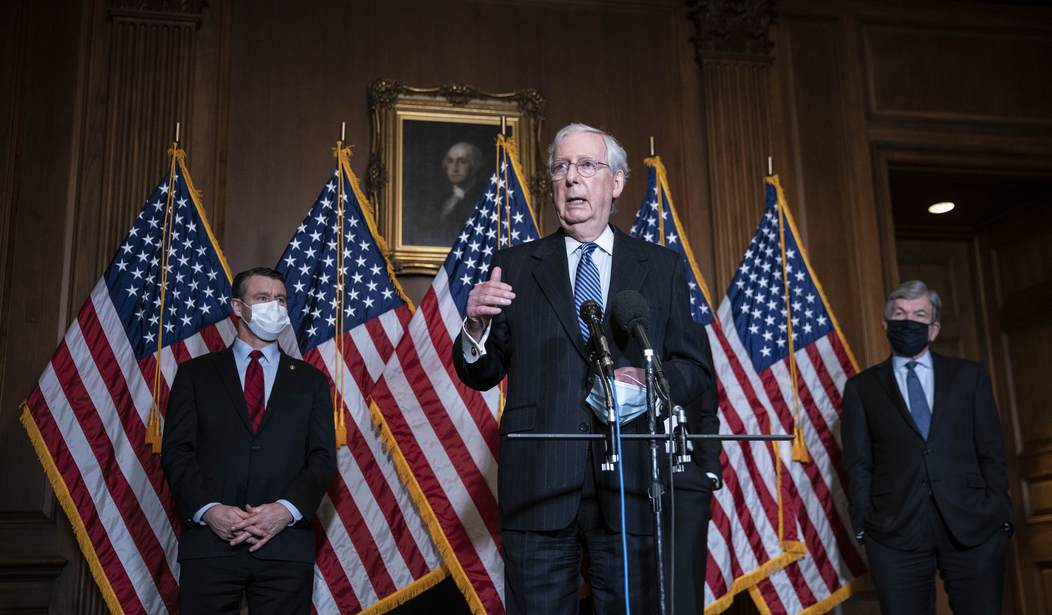More than a dozen Republican members of the Senate held a press conference Thursday afternoon to kick off their final round of attacks on the Democrats' For the People Act before Senate Majority Leader Chuck Schumer (D-NY) brings it to the floor for a vote as early as next week.
Republican Leader Mitch McConnell (KY) called S.1 "a solution in search of a problem" and defended states such as Georgia where state leaders have enacted measures to make cheating in elections more difficult. "None of them are designed to suppress the vote," McConnell said, adding there is "no rational basis" for the federal takeover of elections proposed in S.1.
As Townhall has reported since the introduction of S.1—and its counterpart H.R.1 in the House of Representatives—the For the People Act is part of Democrat efforts to reshape and empower the federal government by busting norms and restructuring the way our country is run.
"In Tennessee, we have really well-run elections and we want to continue—we believe in one person, one vote," noted Republican Senator Marsha Blackburn. "S.1 and all the different versions of S.1, in essence, are pieces of legislation that will make it literally easier to cheat," Blackburn added.
The For the People Act would prohibit states from requiring photo identification to vote as well as ban restrictions on ballot harvesting. Voter ID—a security measure already enacted by dozens of states as well as all but one country in Europe—is one of the most popular practices among Americans. Nationwide polling over the last four years shows anywhere between 56 percent and 76 percent of voters favoring laws that require government-issued identification to verify voting eligibility.
Recommended
Senator Lindsey Graham (R-SC) called S.1 "the mother of all power grabs" and pointed out that House Democrats filed their version of the For the People Act before state legislatures had met to discuss passing new voting laws. "This has got nothing to do with improving voting," he said of the Democrats' plan to federalize elections.
Montana's Steve Daines contextualized the For the People Act within the larger Democrat agenda, describing it as a play in three acts. Statehood for Washington, D.C. was the first act, explained Daines, expanding and packing the Supreme Court with leftist jurists was the second, and the third is S.1.
John Cornyn of Texas—a state where an election protection bill has become a hotly debated issue—debunked Democrat talking points about state laws to protect elections. In Georgia, a state vilified by the Left for its new election law, residents have more time to request a mail-in ballot than New York and more days for early voting than Massachusetts. Delaware, represented for decades in the Senate by now-President Joe Biden who participated in attacks against Georgia's law, won't have early voting until 2022. "Democrats' narrative of widespread voter suppression" by Republicans, Cornyn said, "is a false narrative."
"Simply intolerable" is how Utah Senator Mike Lee described the For the People Act. Lee warned that we know "what happens in governments when they old elections but the government decides who's on the ballot—so too when governments fund campaigns," addressing the taxpayer-funded campaigns that would see millions fund those running for office based on the federal government's recognition of legitimate candidates.
Texas Senator Ted Cruz slammed President Biden and Vice President Harris for their "disgraceful" and "fearmongering" rhetoric that saw the two call Georgia's election security measure "Jim Crow 2.0." S.1 is "not about protecting the right to vote... this is an abuse of power from the Democrats," Cruz said. "The media has not covered even a fraction of the brazen abuse that is reflected in this bill" he referred to as "brazen and cynical."
The House version of the For the People Act passed in March 220 to 210, and Leader Schumer plans to bring his chamber's version for a vote before the August recess.

























Join the conversation as a VIP Member